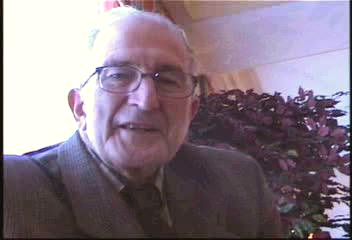
NASHVILLE, Tenn. (BP)–Antony Flew, a legendary British philosopher and atheist, has changed his mind about the existence of God in light of recent scientific evidence.
Flew — a prolific author who has argued against the existence of God and the claims of Christianity for more than 50 years — first revealed his change of mind in a video of a discussion with several others at New York University organized by the Institute for Metascientific Research. The video, released in December, is titled, “Has Science Discovered God?”
Flew said he is now best described as a deist — a person who believes God created the universe but is not actively involved in people’s lives today.
“I don’t believe in the God of any revelatory system, although I am open to that,” Flew said in an interview for the winter 2005 edition of Philosophia Christi, the journal of the Evangelical Philosophical Society. “But it seems to me that the case for … [a] God who has the characteristics of power and also intelligence is now much stronger than it ever was before.”
Flew, 81, regularly attended the Socratic Club, a weekly religious forum led by famed Christian apologist C.S. Lewis while he attended college at Oxford. Flew proclaimed the lack of evidence for God while teaching at Oxford, Aberdeen, Keele and Reading universities in Britain. He also published numerous books and articles denouncing belief in God.
Flew credits his newfound belief in God to arguments from design such as those espoused by the “intelligent design” (ID) movement. ID argues that the universe operates in such a way that it points to the existence of an intelligent creator.
“I think that the most impressive arguments for God’s existence are those that are supported by recent scientific discoveries,” Flew said. “… I think the argument to Intelligent Design is enormously stronger than it was when I first met it.”
Although many atheists appeal to naturalistic evolution as a method by which the world could have come into existence apart from God, Charles Darwin himself acknowledged that the process of evolution requires a creator to start the process, Flew said.
“Darwin himself, in the fourteenth chapter of The Origin of Species, pointed out that his whole argument began with a being which already possessed reproductive powers,” Flew said. “This is the creature the evolution of which a truly comprehensive theory of evolution must give some account. Darwin himself was well aware that he had not produced such an account.”
While Flew said he does not believe in a God who is active in the lives of humans, he is “open to” the possibility of divine revelation. He also believes that Christians are intellectually justified in holding to their religion and that the resurrection of Jesus has more evidential support than any other reported miracle in history.
“The evidence for the resurrection is better than for claimed miracles in any other religion,” Flew said. “It’s outstandingly different in quality and quantity, I think, from the evidence offered for the occurrence of most other supposedly miraculous events.”
Gary Habermas, chairman of the department of philosophy and theology at Liberty University in Lynchburg, Va., told Baptist Press that Flew’s decision to believe in God points to the strength of theistic arguments.
“His conversion is a testimony to the many, especially scientific figures, who are coming by way of intelligent design,” said Habermas, who conducted the interview with Flew in Philosophia Christi. “… The fact that he has become a theist is a testimony to the type of evidence we have for God’s existence today.”
Flew’s status as a world-famous atheist makes his conversion to belief in God particularly significant, Habermas said in an interview with Baptist Press.
“His conversion to theism is very valuable because of his stature,” Habermas said. “The reason this story is going around the world is that he, not just anybody, but he, has converted to theism. I think that’s very significant.”
Despite his belief in the existence of God, Flew said it is unlikely that he will ever become a Christian. The major evidence against the God of Christianity is the problem of evil, Flew said.
The problem of evil refers to the apparent tension between the existence of a good God and the presence of evil in the world.
“The problem of evil is a problem … for Christians,” Flew said. “The thesis that the universe was created and is sustained by a Being of infinite power and goodness is flatly incompatible with the occurrence of massive undeniable and undenied evils in that universe.”
Flew also argues that God does not have “any preferences … about or any intentions concerning human behavior or about the eternal destinies of human beings.”
Although he does not accept Christianity, Flew emphatically denies the possibility that he would ever become a follower of Islam, citing Islam’s commitment to conquer all of its opponents.
“I would never regard Islam with anything but horror and fear because it is fundamentally committed to conquering the world for Islam,” Flew said.
Flew will present a more fully developed explanation of his conversion to belief in God in a forthcoming edition of his book, “God & Philosophy.”
Earlier works by Flew include “Atheistic Humanism,” “Darwinian Evolution,” “A Dictionary of Philosophy,” “Introduction to Western Philosophy” and “How to Think Straight: An Introduction to Critical Reasoning.”
–30–

















